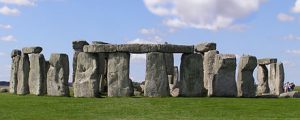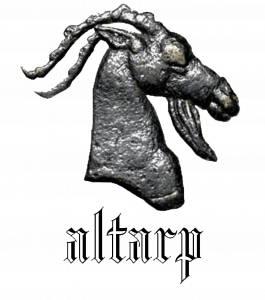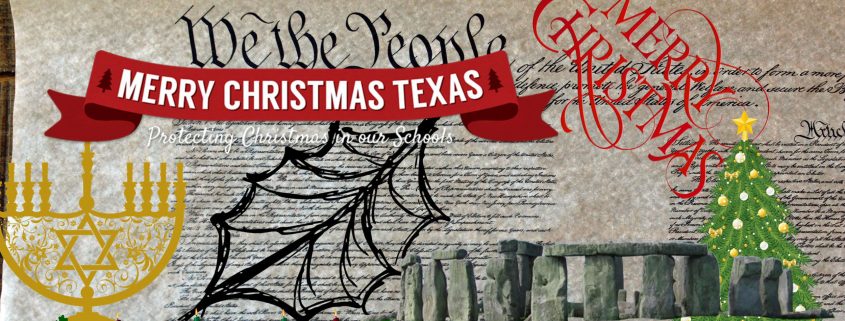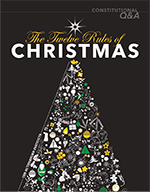Christmas is the Season to Be Jolly and Exhibit Ignorance
Every year at Christmas time, a new flock of educators, administrators, and political activists feel compelled to reveal their ignorance about the Establishment Clause of the U. S. Constitution and push what they feel is the correct place for Christmas in an ever evolving religious landscape.
“Congress shall make no law respecting an establishment of religion, or prohibiting the free exercise thereof…”.
To be fair, the Establishment Clause is not as simple as it appears in the Bill of Rights.
The Founders’ Perspective (Simplified)
The Founders were concerned about doing away with government’s support of the Established Church of England, the supreme governor of which is the monarch. For over a thousand years Christian Churches remained part of the political establishment in Europe affirming Monarchs’ divine right to be kings. The Founders ended that cozy relationship on the Federal level. It took many years for the 14th Amendment and the Supreme Court to eliminate religions’ meddlesome relationship with people at the state level.
The 14th Amendment granted citizenship to all persons born or naturalized in the United States. It was an incremental step in providing equal protection under the laws to all people including former slaves.
Even after the Founders plainly said that church and Federal Government must be separate, state legislators continued to push religious agendas in state government. They did so because a majority of the people wanted it, and it was perfectly legal to do so.
The Texas Constitution said, and still says, “”No religious test shall ever be required as a qualification to any office, or public trust, in this State; nor shall any one be excluded from holding office on account of his religious sentiments, provided he acknowledge the existence of a Supreme Being.” (Article 1, Section 4 – underline is ours) Like many archaic state laws, this clear violation of the now fully incorporated first amendment is not being enforced.
The Scopes Monkey Trial is now history but there is still a tendency for special interests to try to instill their beliefs in legislation. In the end, belief and religion are inseparable. Unfortunately legislation based on belief alone is very prevalent.
The new heretics are the “Deniers,” those who do not follow or accept the wisdom of prevailing belief.
How can a Christian Holiday Possibly be Constitutional?
At the time of the founding of our Republic, Christmas was not a national holiday. When it became a holiday in 1870, it was fashioned around gift giving and the nostalgia of immigrants yearning for their old customs.
In colonies heavily influenced by Calvinist Christian dogma, Christmas was banned during much of the 17th century. Massachusetts passed a law in 1659 to punished Christmas observers with a fine of five shillings, now equivalent to about $31.76.
Gradually the commercial aspects of a year-end holiday eroded religious opposition. Christmas was well on its way to becoming a beloved secular holiday. Still it did not happen quickly, and for reasons that are difficult for some to understand, the fight continues.
Courts Keep the Constitution Current
Over the years courts have had to rule about how restrictive the Establishment Clause is.
There are many who argue that any relationship between government and religion must be totally banned. Even saying Merry Christmas in the work place must be banned! Now for some, saying Merry Christmas demonstrates how brave they are to buck the political correctness police.
Where is the fine line between encouraging religion and actively impeding the “free exercise thereof…?”
The Constitution of the State of Wyoming in its Declaration of Rights has solved one of the questions relating to government financial support of religion; they forbid it.
§019. Appropriations for sectarian or religious societies or institutions prohibited.
No money of the state shall ever be given or appropriated to any sectarian or religious society or institution.
The Federal Government has been less disciplined in its largesse, doling out money to all manner of charitable institutions, many of which have strong ties to religious entities. Then it becomes necessary for citizens to question the line between helping religion, remaining neutral, or impeding it. Courts have decided these questions in an evolving web of complexity. The complexity of the question may provide limited cover to the annual display of ignorance about Christmas. School administrators are not expected to be experts in Constitutional Law, but they should know the basics. Here are a few of the basics.
Establishment Clause – Supreme Court Decisions
Nativity Scenes: Lynch v. Donnelly, 492 U.S. 573 (1989). A Nativity scene, as part of a larger public holiday display, was declared unconstitutional by both a District Court and the Court of Appeals. The Supreme court reversed the lower courts and explained the rationale behind its ruling: “The Constitution does not require complete separation of church and state; it affirmatively mandates accommodation, not merely tolerance, of all religions, and forbids hostility toward any. ” (underline ours)
When the Nativity Scene contained the proselytizing phrase, “Gloria in Excelsis Deo! ” it was declared unconstitutional in County of Allegheny v. American Civil Liberties Union, 492 U.S. 573 (1989)
Christmas Trees and Menorah: County of Allegheny v. ACLU “…menorah display does not have the prohibited effect of endorsing religion, given its “particular physical setting.” Its combined display with a Christmas tree and a sign saluting liberty does not impermissibly endorse both the Christian and Jewish faiths, but simply recognizes that both Christmas and Chanukah are part of the same winter holiday season, which has attained a secular status in our society.
Free Exercise Clause
In Cantwell v. Connecticut, 310 U.S. 296 (1940), for the first time the Supreme Court held that the peaceful expression of beliefs is protected from infringement by both the Federal Government and all of the States (Incorporation). The free exercise of belief includes both belief in religion and non-belief in religion.
Examples of Recent Overzealous Prohibitions
Every year at Christmas time, news reports abound about people instituting restrictive policies for holiday observations.
A Principal in the Elkhorn School District (Omaha, Nebraska) banned Christmas decorations at her school. She was quickly corrected by her administrators. Among the banned items were candy canes because the “J” shape clearly denotes Jesus! As an on-going personnel matter, the District cannot comment on the matter. We can only speculate that her youth and ignorance of Constitutional Law got her in trouble with the old people.
A Washington State senior center reportedly banned religious Christmas expression including saying “Merry Christmas,” singing Christmas Carols, or displaying Christmas cards in any of the complex’s common areas, including doorposts of the apartments. The building manager of Providence Place in Chehalis, WA may have incorrectly told a resident that the display of such items violated HUD regulations. The same manager is reported to have allowed the display of a menorah in the common area while requiring a resident to remove a Mezuzah from her doorframe. The weasel words, “may,” “reportedly,” and “reported” are used here because it is hard to know the truth of news articles nowadays. Management now denies the claims by residents who wish to remain anonymous.
Here is the truth about organizations that get HUD money
Merry Christmas Texas
In 2013, the Texas State legislature passed HB 308 which guarantees First Amendment rights to everybody involved in Winter Celebrations in the State’s school districts.
WINTER CELEBRATIONS.
(a) A school district may educate students about the history of traditional winter celebrations, and allow students and district staff to offer traditional greetings regarding the celebrations, including:
(1) “Merry Christmas”;
(2) “Happy Hanukkah”; and
(3) “happy holidays.”
(b) Except as provided by Subsection (c), a school district may display on school property scenes or symbols associated with traditional winter celebrations, including a menorah or a Christmas image such as a nativity scene or Christmas tree, if the display includes a scene or symbol of:
(1) more than one religion; or
(2) one religion and at least one secular scene or symbol.
(c) A display relating to a traditional winter celebration may not include a message that encourages adherence to a particular religious belief.
The author of the bill decided to help create an environment in the schools that allows everybody to celebrate in traditional ways without fear of criticism when his son came home from school and told him that his class decorated a holiday tree with holiday ornaments.
The Texas law appears to anticipate any criticism by following Supreme Court rulings, some of which were cited above.
Nevertheless the ACLU criticized the law because it says the law lacks a required secular educational purpose, even though paragraph (a) states the avowed educational purpose is to learn about traditional winter celebrations.
The reality is that Winter Celebrations have become highly secular. An additional educational purpose of such a law could be to reaffirm the wisdom of the Establishment and Free Exercise Clauses of the First Amendment.
Winter Celebrations
There exist evidence that the Christian Church chose the date of December 25 to commemorate the birth of Jesus because it conveniently coincided with earlier celebrations around the time of the winter solstice. The history of choosing that date and controversies over its selection are beyond the scope of the present discussion.
The English word Christmas is also subject to debate. Deriving from Old English Cristes-messe, meaning Christ’s Mass, the origin and meaning of the word Mass itself in the Christian sense is speculative.
As noted above, there were times when Christmas itself was outlawed by Christian communities because it did not commemorate a historically accurate day for the birth of Christ. Establishing such a date has always been impossible because of the lack of extra-scriptural references to an event lost in time.
Every year there is a lot of discussion among some Christian groups to “put Christ back in Christmas.” Certainly devout Christians could do this on a personal observational basis, but to force the issue into the secular realm would only encourage the annual assault on the word Christmas.
The celebration of the Winter Solstice dates back to ancient times.
 Stonehenge is a prehistoric monument in Wiltshire, England. Its primary axis aligns with the sunset at the winter solstice. Not much can be authoritatively known about prehistoric people but the fact is they built impressive structures that show obvious astronomical features. It is logical to assume that they celebrated astronomical events and probably related their observations as having something to do with gods.
Stonehenge is a prehistoric monument in Wiltshire, England. Its primary axis aligns with the sunset at the winter solstice. Not much can be authoritatively known about prehistoric people but the fact is they built impressive structures that show obvious astronomical features. It is logical to assume that they celebrated astronomical events and probably related their observations as having something to do with gods.
Newgrange is another very large structure in England that aligns with the winter solstice at sunrise.
A few well documented ancient winter solstice celebrations include: Saturnalia, the most popular of Roman festivals; Dōngzhì Festival (Chinese: 冬至) celebrated throughout east Asia; Inti Raymi, celebrated in winter (June) in Peru; Shab-e Yalda, celebrated by Iranians, originally to celebrate the triumph of of the sun god, Mithra, over darkness; Tekufat Tevet.” ( “תקופת טבת”), one of the four seasons of the year recognized by Talmud scholars.
Anciently just about everybody celebrated the seasons as a demarcation of activities that governed their ability to provide food and shelter, and stay alive.
How to Prove that you are not Ignorant at Christmas Time
The U.S. Constitution, Supreme Court decisions, Lower Court Decisions, and undoubtedly other unimpeachable authorities all say it’s OK to observe Christmas, Hanukkah, Ramadan, Kwanzaa, Diwali, the Chinese New Year, and the Winter Solstice with no concern that the First Amendment and its Establishment Clause will be in danger. The politically correct crowd seem eternally intent on interfering with the Free Exercise Clause. They are miserable sheep, and some say insufferable Grinches.
To be on the safe side, you may consider consulting an excellent guide published by the Rutherford Institute, entitled “Twelve Rules of Christmas.” The choice of the number 12 has nothing to do with the 12 Apostiles, Jewish Numerology, or donuts.
Practical Advice to Get Along and Enjoy Christmas
As practical advice, be aware of when Chanukah begins and tell your Jewish friends “Happy Hanukah,” especially if your Hebrew is not very good and you cannot pronounce Chanukah. ( חנוכה)
An interesting fact about Chanukah is that the date shifts around because of the Lunar Calendar. It has nothing to do with a solstice. It lasts eight days from the 25th day of Kislev to the second day of Tevet, and involves lots of food and fun.
The way Court decisions have come down over the years, one could argue that Hanukah saved Christmas. The healthy secular nature of Hanukah has rubbed off on Christmas displays rendering them sufficiently secular.
If your intended audience for a Winter Holiday Greeting doesn’t speak English very well, try to determine which of these is most appropriate: Feilz Navidad; Feliz Natal; Buon Natale; Bon Nadal; (yes, these all deal with a birth but they will be happy you tried); Joyeux Noël; Fröhliche Weihnachten; Vrolijk Kerstfeest; God Jul; Glædelig Jul; Nadolig Llawen; Wesołych Świąt (This is Polish. Guaranteed to make any Pole happy).
While there are Christian Arabs who may appreciate, eid milad mjyd! (عيد ميلاد مجيد!), stick with English and say Seasons Greetings! That was what President Eisenhower put on his Holiday Cards.
Otherwise if you are in WalMart in Texas, say Merry Christmas. They may reply Happy Holidays and smile at you. The smile is worth the exercise. Everybody should lighten up. For most of the country, Christmas is a miserably cold time of year. A little Christmas Cheer (secular, of course) goes a long way to bring people together. So say Merry Christmas, and spend your money wisely, if not abundantly.
The Constitution guarantees that you are free to exercise your religious belief, but you are not entitled to interfere with that same right afforded to all other citizens.
Contrary to what the New York Times opined in 2016, there is a war on Christmas, but it is only a small part of an on-going war on the First Amendment, and particularly free speech. Nowhere is this war more apparent that on college campuses where the free exchange of competing ideas is being challenged by an intolerant cabal of administrators, instructors, and compliant juveniles.
The First Amendment is about Toleration. Look it up.
If John Milton were alive today and could opine about the assault on free speech, all he would have to do is define oligarchy as university administrators who tolerate the banal assault on free speech.
What should ye do then, should ye suppress all this flowery crop of knowledge and new light sprung up and yet springing daily in this city? Should ye set an oligarchy of twenty engrossers over it, to bring a famine upon our minds again, when we shall know nothing but what is measured to us by their bushel? Believe it, lords and commons! they who counsel ye to such a suppressing, do as good as bid ye suppress yourselves; and I will soon show how. If it be desired to know the immediate cause of all this free writing and free speaking, there cannot be assigned a truer than your own mild, and free, and humane government; it is the liberty, lords and commons, which your own valorous and happy counsels have purchased us; liberty which is the nurse of all great wits: this is that which hath rarified and enlightened our spirits like the influence of heaven; this is that which hath enfranchised, enlarged, and lifted up our apprehensions degrees above themselves. Ye cannot make us now less capable, less knowing, less eagerly pursuing of the truth, unless ye first make yourselves, that made us so, less the lovers, less the founders of our true liberty. We can grow ignorant again, brutish, formal, and slavish, as ye found us; but you then must first become that which ye cannot be, oppressive, arbitrary, and tyrannous, as they were from whom ye have freed us. That our hearts are now more capacious, our thoughts more erected to the search and expectation of greatest and exactest things, is the issue of your own virtue propagated in us; ye cannot suppress that, unless ye reinforce an abrogated and merciless law, that fathers may dispatch at will their own children. And who shall then stick closest to ye and excite others? Not he who takes up arms for coat and conduct, and his four nobles of Danegelt. Although I dispraise not the defence of just immunities, yet love my peace better, if that were all. Give me the liberty to know, to utter, and to argue freely according to conscience, above all liberties. (John Milton, in a speech before Parliament in 1644)








Community Discussion
Be respectful, but please speak your mind! We want a healthy discussion. There are no right or wrong answers here.